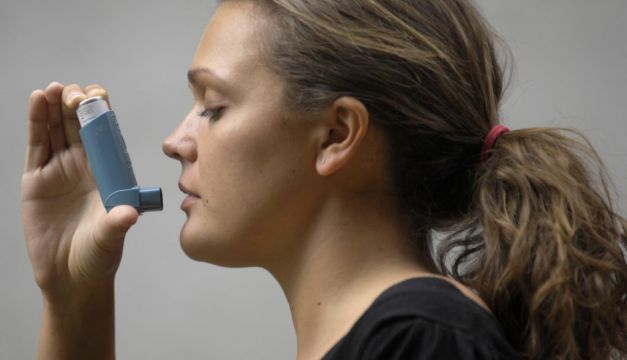Getting a bit out of breath during a strenuous workout or sprinting for a bus is usually completely normal.
But if you’re breathless for no apparent reason, or getting far more puffed out than usual, you might be wondering whether something is wrong.
Here, experts to talk through some common causes.
Asthma
Getting breathless when you go out in cold air, exercise, or you’re around animal fur? These can all be triggers for asthma – a common condition caused by inflammation of the tubes that carry air in and out of the lungs.
“Symptoms of asthma include wheezing, feeling short of breath, tightness of the chest and also a dry cough, particularly at night,” says Caoimhe McAuley, MPSI, director of pharmacy and superintendent pharmacist at Boots Ireland. “If experiencing these symptoms, it is best to see your GP to confirm a diagnosis of asthma, and to begin to manage it with medication [usually involving inhalers].”
View this post on Instagram
Pharmacists can also provide asthma education and help people with their inhaler technique. It’s also important to be aware of asthma attack risk, adds McAuley.
“For people who already have a diagnosis but feel their symptoms are getting worse, it’s important to see your doctor again. This is because your asthma may now be uncontrolled due to different factors, such as not using your medication correctly. If asthma which is worsening is left unmanaged, there is a risk of having an asthma attack,” she explains.
“Emergency warning signs of an asthma attack include severe breathlessness, worsening of symptoms that do not respond to the use of the blue reliever inhaler, and pale/blue lips and fingertips.” If this happens, seek help immediately.
Infections
If you’ve also been feeling generally unwell with flu-type symptoms, breathlessness could be due to an infection.
McAuley says: “There are many different types of respiratory infections, such as the common cold, chest infections, bronchitis and pneumonia. Breathlessness can be a symptom along with sneezing, sore throat, runny nose, fever, muscle pain, and a cough which may bring up phlegm.
“Most respiratory infections pass within a week or two by resting, staying hydrated and using painkillers to relieve symptoms,” she adds. “You should contact you doctor if your symptoms get worse, if you cough up blood/notice blood in your phlegm, if you’re pregnant or over 65, and if you have a health condition that weakens your immune system like HIV or take medications which weaken your immune system, like corticosteroids.”
Underlying cardiovascular problems
Breathlessness could be linked to underlying cardiovascular issues – affecting the heart and blood vessels – in a range of ways.
“People with angina, caused by the narrowing of the arteries to the heart, and thus a lack of oxygen to the heart, can experience chest pain and breathlessness,” says Dr Angie Brown, consultant cardiologist and medical director at the Irish Heart Foundation.
View this post on Instagram
“Severe valve disease either narrowing, causing valve stenosis, or a significant leaky/regurgitant valve, can also put pressure on the heart, causing breathlessness,” Brown adds. “Abnormal heart rhythms such as atrial fibrillation (AF) can lead to breathlessness in some people – particularly if the heart rate is fast, this is sometimes accompanied by palpitations.”
Heart attack
A heart attack “is more likely to cause sudden breathlessness, that may be accompanied by chest pain, and sometimes other symptoms such as throat or left arm pain, sweating and nausea can occur,” says Brown. “If you think you are having a heart attack, the advice is to call 112 or 999 as this is an emergency and you need to seek urgent medical attention.”
Remember, while heart attacks are often sudden and severe, symptoms can sometimes be more mild too – especially in women. If in doubt, always seek urgent help, just in case.
Lung cancer
Most people experiencing breathlessness will not have cancer – but it’s important to be aware of the warning signs. Lung cancer is the fifth most common cancer in Ireland, according to the Irish Cancer Society, mostly affecting people aged over 50, although it can impact younger adults too.
Breathlessness may be accompanied by wheezing, chest pain, frequent chest infections and a chronic cough. People may also feel tired for no reason, experience unexplained weight loss and notice they’re coughing up blood-stained phlegm. These symptoms don’t necessarily mean you have cancer, but it’s always best to get things checked quickly.
Anaemia

Getting more out of breath than usual – and exhausted all the time? It could be worth getting your iron levels checked.
“While lung conditions like asthma can lead to shortness of breath, especially during exercise, having low blood iron can be another contributing factor. This is known as anaemia, with symptoms ranging from mild to severe,” says McAuley. “Symptoms include tiredness, shortness of breath or chest pain. You may also experience fatigue, dizziness or light-headedness, cold hands and feet, pale skin.
“The most common reason anaemia occurs is due to an iron deficiency in the body, but it can also be due to a vitamin deficiency, heavy menstrual periods, pregnancy, or chronic conditions,” she adds. “See your doctor if you experience tiredness, weakness and breathlessness and don’t know why this is happening.”
Always speak to your own doctor if you are concerned about your health.







